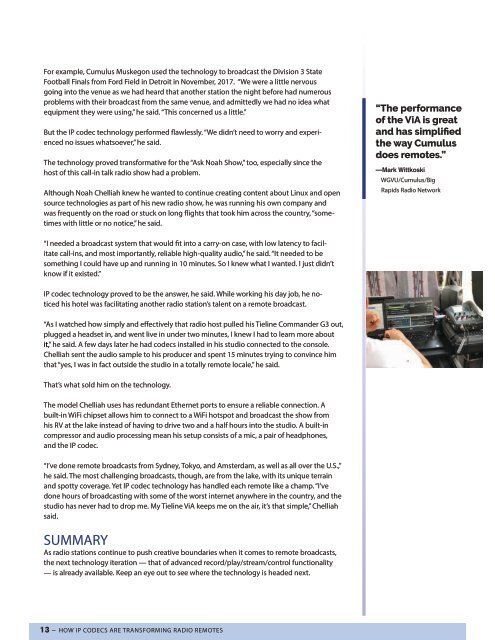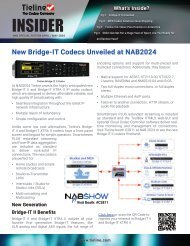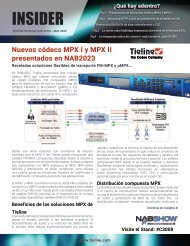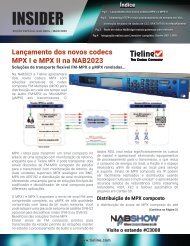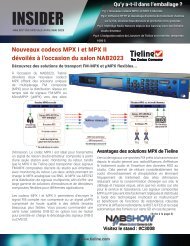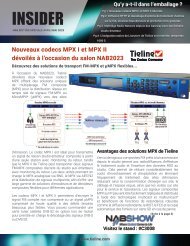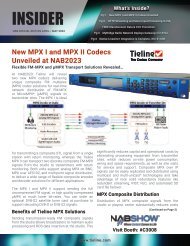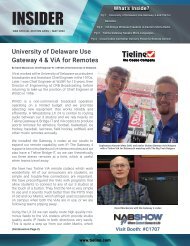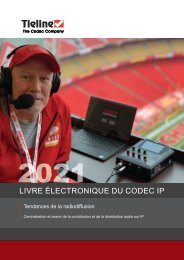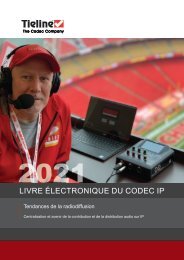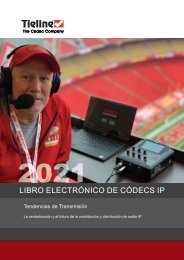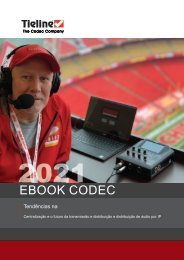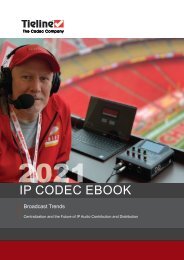(English) How IP Codecs...eBook
Learn more about the latest in IP audio codec technologies available to broadcasters to get the best results when remote broadcasting.
Learn more about the latest in IP audio codec technologies available to broadcasters to get the best results when remote broadcasting.
Create successful ePaper yourself
Turn your PDF publications into a flip-book with our unique Google optimized e-Paper software.
For example, Cumulus Muskegon used the technology to broadcast the Division 3 State<br />
Football Finals from Ford Field in Detroit in November, 2017. “We were a little nervous<br />
going into the venue as we had heard that another station the night before had numerous<br />
problems with their broadcast from the same venue, and admittedly we had no idea what<br />
equipment they were using,” he said. “This concerned us a little.”<br />
But the <strong>IP</strong> codec technology performed flawlessly. “We didn’t need to worry and experienced<br />
no issues whatsoever,” he said.<br />
The technology proved transformative for the “Ask Noah Show,” too, especially since the<br />
host of this call-in talk radio show had a problem.<br />
Although Noah Chelliah knew he wanted to continue creating content about Linux and open<br />
source technologies as part of his new radio show, he was running his own company and<br />
was frequently on the road or stuck on long flights that took him across the country, “sometimes<br />
with little or no notice,” he said.<br />
“The performance<br />
of the ViA is great<br />
and has simplified<br />
the way Cumulus<br />
does remotes.”<br />
—Mark Wittkoski<br />
WGVU/Cumulus/Big<br />
Rapids Radio Network<br />
“I needed a broadcast system that would fit into a carry-on case, with low latency to facilitate<br />
call-ins, and most importantly, reliable high-quality audio,” he said. “It needed to be<br />
something I could have up and running in 10 minutes. So I knew what I wanted. I just didn’t<br />
know if it existed.”<br />
<strong>IP</strong> codec technology proved to be the answer, he said. While working his day job, he noticed<br />
his hotel was facilitating another radio station’s talent on a remote broadcast.<br />
“As I watched how simply and effectively that radio host pulled his Tieline Commander G3 out,<br />
plugged a headset in, and went live in under two minutes, I knew I had to learn more about<br />
it,” he said. A few days later he had codecs installed in his studio connected to the console.<br />
Chelliah sent the audio sample to his producer and spent 15 minutes trying to convince him<br />
that “yes, I was in fact outside the studio in a totally remote locale,” he said.<br />
That’s what sold him on the technology.<br />
The model Chelliah uses has redundant Ethernet ports to ensure a reliable connection. A<br />
built-in WiFi chipset allows him to connect to a WiFi hotspot and broadcast the show from<br />
his RV at the lake instead of having to drive two and a half hours into the studio. A built-in<br />
compressor and audio processing mean his setup consists of a mic, a pair of headphones,<br />
and the <strong>IP</strong> codec.<br />
“I’ve done remote broadcasts from Sydney, Tokyo, and Amsterdam, as well as all over the U.S.,”<br />
he said. The most challenging broadcasts, though, are from the lake, with its unique terrain<br />
and spotty coverage. Yet <strong>IP</strong> codec technology has handled each remote like a champ. “I’ve<br />
done hours of broadcasting with some of the worst internet anywhere in the country, and the<br />
studio has never had to drop me. My Tieline ViA keeps me on the air, it’s that simple,” Chelliah<br />
said.<br />
SUMMARY<br />
As radio stations continue to push creative boundaries when it comes to remote broadcasts,<br />
the next technology iteration — that of advanced record/play/stream/control functionality<br />
— is already available. Keep an eye out to see where the technology is headed next.<br />
13 – HOW <strong>IP</strong> CODECS ARE TRANSFORMING RADIO REMOTES


